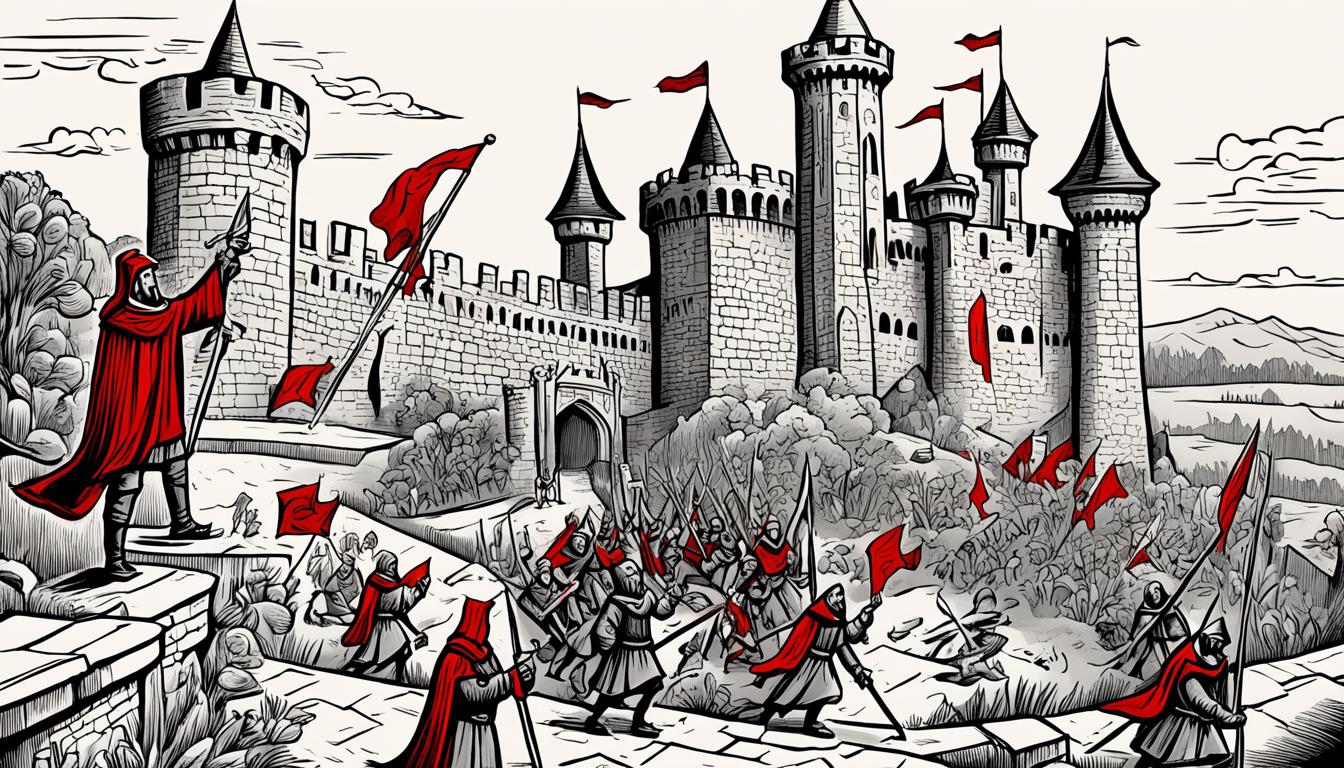In “Who Murdered Chaucer?” Terry Jones embarks on an enthralling historical investigation, uncovering the mystery surrounding the death of medieval poet, Geoffrey Chaucer. This book summary explores Jones’ compelling narrative, unearthing the historical context, suspects, and theories surrounding this intriguing murder mystery.
Key Takeaways:
- Geoffrey Chaucer was a famous medieval poet and author of the Canterbury Tales
- Terry Jones conducts a thorough investigation into the mysterious circumstances of Chaucer’s death
- Jones explores Chaucer’s connections and enemies to uncover potential motives and suspects
- The legacy of Chaucer’s murder has lasting impacts on literature and historical interpretation
- “Who Murdered Chaucer?” presents a captivating exploration of this intriguing medieval murder mystery
Introduction to Geoffrey Chaucer
Geoffrey Chaucer, born in the early 1340s, was one of the most prominent medieval poets of his time. He served as a diplomat to a number of countries, including Italy and France, and worked as a civil servant in England.
Chaucer’s most famous work, The Canterbury Tales, was written in Middle English and tells the story of a group of pilgrims traveling to the shrine of Thomas Becket in Canterbury. The collection of stories highlights the social and economic issues of the time, while also exploring themes such as love and betrayal.
Chaucer’s literary accomplishments greatly impacted medieval literature and paved the way for future English authors.
In this upcoming article, we will dive deeper into the life and legacy of this renowned medieval poet, examining how his artistry and wit continue to inspire readers today.
The Circumstances of Chaucer’s Death
Geoffrey Chaucer, the renowned medieval poet, died under mysterious circumstances that have puzzled historians for centuries. Terry Jones, in his book “Who Murdered Chaucer? A Medieval Mystery,” carefully investigates the possible causes of Chaucer’s death to shed some light on this perplexing case.
“The official version of Chaucer’s death is death by natural causes, but the symptoms he showed point to something more suspicious,” says Jones in his book.
According to historical records, Chaucer died in 1400, but very little is known about the specific circumstances surrounding his death. Some suggest that he may have been murdered, while others claim that he died of natural causes. This lack of clarity surrounding Chaucer’s death has only added to his legendary status.
“If we can determine the cause of Chaucer’s death, we can better understand the man himself and his place in history,” writes Jones in his book.
However, due to the lack of clear evidence and multiple theories surrounding Chaucer’s death, it remains a complex and intriguing mystery.
The next section delves deeper into the historical context of Chaucer’s time, exploring the societal norms and political intrigues of medieval England.
Historical Context of Chaucer’s Time
The historical context of medieval England during Chaucer’s time sheds light on the societal and political influences that could have impacted his life and death. In the 14th century, England was experimenting with the introduction of a parliamentary system and dealing with the aftermath of the Black Death pandemic that had killed a third of the population. The Peasants’ Revolt, a major uprising of peasants against the ruling nobility in 1381, was another significant event that Chaucer witnessed and that can give us insight into the tensions and struggles of the time.
The historical context of Chaucer’s time provides a valuable lens through which to examine the cultural and social factors that may have contributed to his demise.
Furthermore, Chaucer lived and worked amidst the Hundred Years’ War between England and France and was sent on diplomatic missions to continental Europe. These experiences likely shaped his writing and perspectives on various subjects. The complex and turbulent historical context in which Chaucer lived underscores the importance of considering the wider factors at play when investigating his murder.
Chaucer’s Connections and Enemies
As Terry Jones delves deeper into the investigation, he uncovers the potential motives and suspects in the case by examining the relationships of Chaucer, both friendly and hostile. Chaucer had numerous connections with powerful individuals of his time, including John of Gaunt, Richard II, and Henry IV, and this web of associations may have contributed to his demise.
On the other hand, Chaucer’s enemies may have played a significant role in his murder. One possible suspect was Thomas Arundel, the Archbishop of Canterbury and a vehement opponent of Chaucer’s religious views. Henry IV, who became king shortly before Chaucer’s death, was another potential adversary due to his disapproval of Chaucer’s political writings.
By analyzing Chaucer’s network and conflicts, we can gain a better understanding of who may have had a motive to harm him. This information is vital to Jones’ investigation and helps shed light on the potential culprits in this intriguing medieval mystery.

Suspects and Theories
Terry Jones and other historians have explored various suspects and theories about Chaucer’s death, shedding light on the possible culprits behind this medieval murder mystery.
One of the suspects was Sir Thomas Usk, a former political ally of Chaucer who turned against him and possibly had motives for murder. Another potential suspect was Richard II, who may have wanted to silence Chaucer after his criticism of the king’s handling of political affairs.
However, other theories suggest that Chaucer’s death was not deliberate, but rather the result of a botched medical treatment. Some historians have implicated Chaucer’s physician, while others attribute his death to the common medical practices of his time.
Regardless of the suspects and theories put forth, the truth behind Chaucer’s murder remains elusive, leaving future historians to keep exploring this fascinating medieval mystery.
Investigating the Crime Scene
Using historical documents and accounts, Terry Jones conducted a thorough Chaucer murder investigation, analyzing the crime scene to piece together the events leading up to Chaucer’s untimely demise. One key detail suggested that Chaucer was likely murdered elsewhere before his body was moved to a room at the Westminster Abbey where he died.
Further investigation revealed possible motives and suspects, including Chaucer’s political connections and enemies who may have had reason to want him out of the picture. Through careful crime scene analysis, Terry Jones presented a plausible scenario for how Chaucer was potentially lured into a trap and met his tragic end.
“The murder of such a prominent and influential figure as Chaucer would have been a significant event in medieval Britain,” Jones notes. “It’s important to fully examine the crime scene and the evidence available in order to better understand this historical mystery.”
Unearthing New Evidence
Terry Jones’ research into Chaucer’s murder has uncovered new evidence that sheds light on the circumstances surrounding his death. Recent discoveries have revealed a possible motive for the crime, which suggests that Chaucer was possibly targeted for his political connections to King Richard II. This new evidence has challenged previously held beliefs about the motive behind his murder and refocused attention on individuals who had close ties to Richard II and may have been involved.
“This new evidence completely changes the direction of our investigation and opens up new possibilities for solving this centuries-old mystery,” says Jones.
In addition to new evidence about the motive and potential suspects, Jones’ investigation has also discovered previously unknown eyewitness accounts that offer a unique perspective on the events leading up to Chaucer’s murder. These accounts provide invaluable insight into the interactions between Chaucer and his potential killers, painting a clearer picture of the events that transpired.
This new evidence provides a fascinating development in the ongoing Chaucer murder investigation, and suggests that there is still much to uncover about this intriguing medieval mystery.
The Legacy of Chaucer’s Murder
The murder of Geoffrey Chaucer continues to be a topic of fascination among literary and historical enthusiasts, leaving a lasting impact on the legacy of this renowned poet. Despite the mystery surrounding his death, Chaucer’s literary contributions, such as his famous Canterbury Tales, have endured through the ages, cementing his place as a beloved figure in English literature.
Chaucer’s murder has also served as inspiration for countless works of fiction and non-fiction, demonstrating the profound impact of this unsolved crime on popular culture. From Terry Jones’ historical investigation to modern-day adaptations, Chaucer’s murder continues to captivate audiences and spark curiosity surrounding the life and death of this legendary poet.
“The legacy of Chaucer’s murder serves as a stark reminder of the enduring power of storytelling and the intriguing mysteries of the past.”
Conclusion
In conclusion, “Who Murdered Chaucer?” by Terry Jones offers an enthralling and captivating historical investigation into the mysterious death of the renowned medieval poet, Geoffrey Chaucer. Jones’ meticulous research and analysis provide fascinating insights into the circumstances surrounding Chaucer’s untimely demise, exploring potential motives and suspects along the way.
Through his engaging and thought-provoking narrative, Jones not only sheds new light on the mystery of Chaucer’s death but also offers readers a fascinating glimpse into the historical context of medieval England, including the political intrigues and societal norms of the time.
The book is a must-read for history buffs, literature fans, and anyone looking to delve into the captivating genre of true-crime historical investigations. Overall, this book summary is a comprehensive guide to the fascinating world of “Who Murdered Chaucer?”.
Thank you for reading!



